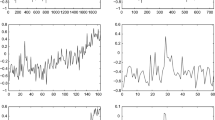Abstract
The focus of the paper is nonparametric detection of changes in the mean of \(m\)-dependent stationary functional data via a cumulative sum (CUSUM) procedure. We consider a projection-based quasi-maximum likelihood CUSUM-procedure which relies on a Darling–Erdős-type limit theorem. Under mild moment assumptions we investigate the asymptotic properties under the null hypothesis and show consistency under the alternatives of either an abrupt or a gradual change in the mean. The finite sample behavior is illustrated in a small simulation study including an application to temperature data from Hohenpeißenberg (Bavaria, Germany).




Similar content being viewed by others
References
Aston J, Kirch C (2012a) Detecting and estimating changes in dependent functional data. J Multivar Anal 109:204–220
Aston J, Kirch C (2012b) Evaluating stationarity via change-point alternatives with applications to fMRI data. Ann Appl Stat 6(4):1906–1948
Berkes I, Gabrys R, Horváth L, Kokoszka P (2009) Detecting changes in the mean of functional observations. J R Stat Soc Ser B Stat Methodol 71(5):927–946
Bosq D (2000) Linear processes in function spaces: theory and applications. Springer, New York
Csörgő M, Horváth L (1997) Limit theorems in change-point analysis. Wiley, Chichester
Dauxois J, Pousse A, Romain Y (1982) Asymptotic theory for the principal component analysis of a vector random function: some applications to statistical inference. J Multivar Anal 12(1):136–154
Dedecker J, Merlevède F (2008) Convergence rates in the law of large numbers for Banach-valued dependent variables. Theory Probab Appl 52(3):416–438
Ferraty F, Vieu P (2010) Nonparametric functional data analysis: theory and practice. Springer, New York
Fremdt S, Horváth L, Kokoszka P, Steinebach J (2014) Functional data analysis with increasing number of projections. J Multivar Anal 124:313–332
Gabrys R, Kokoszka P (2007) Portmanteau test of independence for functional observations. J Am Stat Assoc 102(480):1338–1348
Gombay E, Horváth L (1996) On the rate of approximations for maximum likelihood tests in change-point models. J Multivar Anal 56(1):120–152
Hörmann S, Kokoszka P (2010) Weakly dependent functional data. Ann Stat 38(3):1845–1884
Horváth L, Kokoszka P (2012) Inference for functional data with applications. Springer, New York
Horváth L, Kokoszka P, Steinebach J (1999) Testing for changes in multivariate dependent observations with an application to temperature changes. J Multivar Anal 68(1):96–119
Horváth L, Kokoszka P, Reeder R (2012a) Estimation of the mean of functional time series and a two-sample problem. arXiv:1105.0019v1.
Horváth L, Kokoszka P, Reeder R (2012b) Estimation of the mean of functional time series and a two-sample problem. J R Stat Soc Ser B Stat Methodol 75(1):103–122
Hušková M (1998) Estimators in the location model with gradual changes. Comment Math Univ Carolin 39(1):147–157
Kuelbs J, Philipp W (1980) Almost sure invariance principles for partial sums of mixing \({B}\)-valued random variables. Ann Probab 8(6):1003–1036
Ledoux M, Talagrand M (1991) Probability in Banach spaces: isoperimetry and processes. Springer, Berlin
Lifshits M (1984) Absolute continuity of functionals of supremum type for Gaussian processes. J Math Sci 27(5):3103–3112
Padgett W, Taylor R (1976) Almost sure convergence of weighted sums of random elements in Banach spaces. In: Lecture Notes in Mathematics 526, Springer, New York
Piterbarg V (2012) Asymptotic methods in the theory of Gaussian processes and fields. Amer Math Soc
Ramsay J, Silverman B (2005) Functional data analysis. Springer, New York
Ramsay J, Hooker G, Graves S (2009) Functional data analysis with R and MATLAB. Springer, New York
Tsirelson B (1976) The density of the distribution of the maximum of a Gaussian process. Theory Probab Appl 20(4):847–856
Vostrikova L (1981) Detection of a “disorder” in a Wiener process. Theory Probab Appl 26(2):356–362
Zhou J (2011) Maximum likelihood ratio test for the stability of sequence of Gaussian random processes. Comput Stat Data Anal 55(6):2114–2127
Acknowledgments
We would like to thank the referees for thorough reviews, corrections and valuable suggestions. We acknowledge the data providers in the ECA&D project. Klein Tank, A. M. G. and Coauthors, 2002. Daily dataset of twentieth-century surface air temperature and precipitation series for the European Climate Assessment. Int. J. of Climatol., 22, 1441–1453. Data and metadata available at http://www.ecad.eu.
Author information
Authors and Affiliations
Corresponding author
Rights and permissions
About this article
Cite this article
Torgovitski, L. A Darling–Erdős-type CUSUM-procedure for functional data. Metrika 78, 1–27 (2015). https://doi.org/10.1007/s00184-014-0487-7
Received:
Published:
Issue Date:
DOI: https://doi.org/10.1007/s00184-014-0487-7




